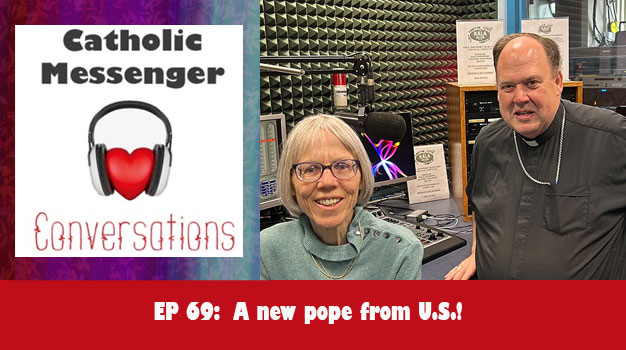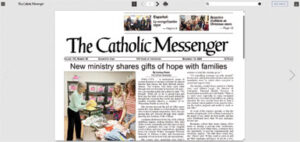 By Barb Arland-Fye
By Barb Arland-Fye
The Catholic Messenger

Leading up to the convocation to elect a new pope, Bishop Dennis Walsh thought Cardinal Robert Prevost, whom he met at the Vatican last fall, “was probably a pretty good candidate for the papacy.” However, “I thought the fact that he was a U.S. citizen would be a strike against him,” the bishop said during a Catholic Messenger Conversations podcast earlier this month.
Bishop Walsh met the future Pope Leo XIV while attending “Baby Bishop School” (the formation program for new bishops) about a week before his ordination to the episcopacy. As prefect of the Dicastery for Bishops, then-Cardinal Prevost led the office that held the formation program for new bishops. “He was at the conference for the whole time, from the morning conference all the way to the evening conference and those were long days,” the bishop said.
Cardinal Prevost gave a talk at the program’s conclusion, trying to synthesize everything presented, seeking feedback on ways to improve the formation program and soliciting questions about information that might be helpful to them in their new roles.
“He’s a very quiet man, a very reflective man and pretty much quite reserved,” Bishop Walsh said of his first impression of the future pope, “but I’ve seen videos of him where he’s just the opposite.” His chosen name, Leo XIV, is a reflection of his appreciation for his namesake, Pope Leo XIII, “a giant in the whole area of Catholic Social Teaching,” the bishop said. “Leo XIII wrote his famous encyclical ‘Rerum Novarum,’ which is the foundational text that really identifies and defines … the natural rights of people.”
Written in response to the Industrial Revolution and its oppression of the working class, “Rerum Novarum” bears similarities to the new Industrial Revolution, especially regarding the development of artificial intelligence, as Pope Leo XIV has said, Bishop Walsh pointed out. “I think the significance of choosing the name Leo (demonstrates) a continuity and a closeness to the Church’s social justice teaching.”
An international perspective
Pope Leo XIV was “a missionary bishop for many years in a very poor diocese (in Peru), so I think he’s always had a passion for justice and that would indicate to me his priority is very good,” Bishop Walsh said. He believes Pope Leo, like Pope Francis, “Is going to be very close to the people. However, I think (Pope Leo) will be much more disciplined in saying what the Church teaches rather than making off-the-cuff remarks and then the Vatican having to say, ‘What the Holy Father meant to say,’” Bishop Walsh said.
He thinks Pope Leo will correct the sense of confusion that sometimes arose during Pope Francis’ papacy regarding Church teaching. “I think there was a lack of precision for the most part about those issues and I think Leo XIV will correct some of that with a more disciplined approach.”
The bishop also sees benefits in Pope Leo’s U.S. citizenship. “It’ll be beneficial for us to hear the pope speak to us in our own language rather than mediated through interpreters. There will be a much more immediate and clearer presentation to Americans about what we’re called to do.”
Bishop Walsh hopes Pope Leo will visit the United State soon to maintain the momentum and energy that his election has generated. Young people, especially, are “looking for some meaning and purpose. I think having someone speak in our own language will go a long way in terms of answering the hungers and thirsts of young people.”
Pope Leo’s ministry in Peru, first as a young priest and then as a bishop, gives him a “much more international view of the world than most citizens from the United States,” Bishop Walsh said. That international perspective (he has dual U.S. and Peruvian citizenship), probably led to his potential as a papal candidate, the bishop surmised.
Building bridges
Pope Leo’s call for peace, bridge building, synodality and encounter are a challenge in the U.S., which struggles with ideology that divides people. Bishop Walsh recalled Pope Benedict XVI talking about the problem of ideology in the U.S. and western countries. “There’s an obsession with politics and a real danger in allowing that to affect people’s worldview,” the bishop said. He thinks the world’s cardinals “were intent on choosing someone that they thought could lead the Church regardless of their ideology.”
“I think Pope Leo has a much broader vision and a broader exposure to poverty and to the needs of people” in developing or poor countries, the bishop said. Those experiences have “affected very much his worldview.”
While the international community has expressed resistance to U.S. influence, “I think people kind of admire the attitude in the United States and the ability to get things done,” the bishop said. He believes that Pope Leo will inspire people to rise above the fear that exists in today’s culture by conveying the message that “Christ is our only hope” through emphasis on Scripture, a sacramental approach and liturgy.
In the pope’s primary role as teacher, Bishop Walsh anticipates “some beautiful things coming out of his office in terms of documents that will affect how I govern, how I minister in the Diocese of Davenport.” He anticipates that “Rerum Novarum” (1891), will also influence Pope Leo XIV’s pontificate.
“A lot of what is contained in that document is still referred to today,” Bishop Walsh said, such as the dignity of the human person, the dignity of workers, preferential option for the poor, the economy at the service of people, and the right to own private property.
“We need to protect human dignity at all times. As we look to the world today, especially the situation here in the United States, and to see people living in fear of being deported,” the bishop said. “Rerum Novarum” serves as a reminder of “the obligation that we have to protect the rights of everyone.”
Like Pope Francis, Pope Leo XIV is a strong supporter of synodality (journeying together), which is not a new concept but one that can serve as a source of continuity in the Church, Bishop Walsh said.
“The Holy Spirit raises in the Church the leadership that the Church needs at that moment in history,” the bishop said. Even so, Pope Leo “still has to get a feel for the greater Church in terms of shaping and forming his vision.”
Listen to the Podcast here or your favorite podcast app. (Ep. 69: A new pope from the U.S.!)









